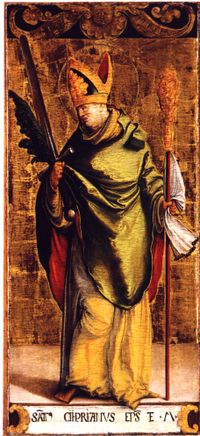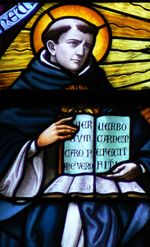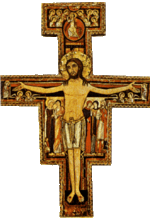Cyprian
| Sanctus Cyprianus Ὁ Ἅγιος Κυπριανός Saint Cyprian |
|
|---|---|
 Icon of Saint Cyprian |
|
| Bishop and Martyr | |
| Born | 3rd century AD North Africa |
| Died | September 14, 258 Carthage, Africa Province, Roman Empire |
| Venerated in | Roman Catholic Church, Eastern Orthodox Church, Oriental Orthodox Church, Anglican Communion, Lutheran Church |
| Feast | September 16 (Roman Catholic Church) September 15 (Church of England), (ECUSA) August 31 (Eastern Orthodox Church) |
- This page is about Cyprian, bishop of Carthage. For other Cyprians, see Cyprian (disambiguation).
Saint Cyprian (Latin: Thascius Caecilius Cyprianus) or Saint Kyprianόs (Greek: Κυπριανός Καρχηδόνος) (died September 14, 258) was bishop of Carthage and an important early Christian writer. He was born circa the beginning of the 3rd century in North Africa, perhaps at Carthage, where he received a classical education. After converting to Christianity, he became a bishop (249) and eventually died a martyr at Carthage.
Contents |
Early life
Cyprian was born around the year 208. He was of a wealthy and distinguished pagan background. In fact, the site of his eventual martyrdom was his own villa. Before becoming a Christian, he was an orator, "pleader in the courts", and a teacher of rhetoric.[1] The date of his conversion is unknown, but after his baptism about 245–248 he gave away a portion of his wealth to the poor of Carthage, as befitted a man of his status. He was either of Punic stock or a Berber.
His original name was Thascius; he took the additional name Caecilius in memory of the presbyter to whom he owed his conversion. In the early days of his conversion he wrote an "Epistola ad Donatum de gratia Dei," and three books of "Testimoniorum adversus Judæos" that adhere closely to the models of Tertullian, who influenced his style and thinking, and are largely interesting as a document in the history of anti-semitism.
His contested election as bishop of Carthage

Not long after his baptism he was ordained deacon, and soon afterward presbyter; and some time between July 248 and April 249 he was chosen bishop of Carthage, a popular choice among the poor who remembered his patronage as demonstrating good equestrian style, while a portion of the presbytery opposed it, for all Cyprian's wealth and learning and diplomacy and literary talents. Moreover, the opposition within the church community at Carthage did not dissolve during his episcopacy.
Soon, however, the entire community was put to an unwonted test. Christians in North Africa had not suffered persecution for many years: the church was assured and lax. Early in 250 the "Decian persecution" began. Measures were first taken demanding that the bishops and officers of the church sacrifice to the emperor. The proconsul on circuit, and five commissioners for each town, administered the edict; but, when the proconsul reached Carthage, Cyprian had fled.
It is quite evident in the writings of the church fathers from various dioceses that the Christian community was divided on this occasion, among those who stood firm in civil disobedience, and those who buckled, submitting in word or in deed to the order of sacrifice and receiving a ticket or receipt called a "libellus". Cyprian's secret departure from Carthage was interpreted by his enemies as cowardice and infidelity, and they hastened to accuse him at Rome. The Roman clergy wrote to Cyprian in terms of disapproval. Cyprian rejoined that he fled in accordance with visions and the divine command. From his place of refuge he ruled his flock with earnestness and zeal, using a faithful deacon as his intermediary.
Controversy over the lapsed
The persecution was especially severe at Carthage, according to Church sources. Many Christians fell away, and were thereafter referred to as "lapsi", but afterward asked to be received again into the Church. Their requests were granted early with no regard being paid to the demand of Cyprian and his faithful among the Carthaginian clergy, who insisted upon earnest repentance. The confessors among the more liberal group intervened to allow hundreds of the lapsed to return to the Church.
Though he had remained in seclusion himself, Cyprian now censured all laxity toward the lapsed, refused absolution to them except in case of mortal sickness, and desired to postpone the question of their re-admission to the Church to more quiet times. A schism broke out in Carthage. Felicissimus, who had been ordained deacon by the presbyter Novatus during the absence of Cyprian, opposed all steps taken by Cyprian's representatives. Cyprian deposed and excommunicated him and his supporter Augendius. Felicissimus was upheld by Novatus and four other presbyters, and a determined opposition was thus organized.
When, after an absence of fourteen months, Cyprian returned to his diocese, he defended leaving his post in letters to the other North African bishops and a tract "De lapsis," and called a council of North African bishops at Carthage to consider the treatment of the lapsed and the apparent schism of Felicissimus (251). The council in the main sided with Cyprian and condemned Felicissimus, though no acts of this council survive. The "libellatici" were to be restored at once upon sincere repentance; but such as had taken part in heathen sacrifices could be received back into the Church only when on the point of death. Afterward this regulation was essentially mitigated, and even these were restored if they repented immediately after a sudden fall and eagerly sought absolution; though clerics who had fallen were to be deposed and could not be restored to their functions.
In Carthage the followers of Felicissimus elected Fortunatus as bishop in opposition to Cyprian, while in Rome the followers of the Roman presbyter Novatian, who also refused absolution to all the lapsed, elected their man as bishop of Rome, in opposition to Cornelius. The Novationists secured the election of a rival bishop of their own at Carthage, Maximus by name. Novatus now left Felicissimus and followed the Novatian party.
But these extremes strengthened the firm but moderating influence exhibited in Cyprian's writings, and the following of his opponents grew less and less. He rose still higher in the favor of the people when they witnessed his self-denying devotion during the time of a great plague and famine.
He comforted his brethren by writing his "De mortalitate," and in his "De eleomosynis" exhorted them to active charity towards the poor, while he set the best pattern by his own life. He defended Christianity and the Christians in the apologia "Ad Demetrianum," directed against a certain Demetrius and the reproach of the heathens that Christians were the cause of the public calamities.
Controversy concerning heretic baptism
But Cyprian had yet to fight another battle, which broke to the surface in 255, in which his opponent was Pope Stephen I. The matter in dispute was the efficacy of baptism in the conventional accepted forms, when it was administered by heretics.
Stephen declared baptism by heretics valid if administered according to the institution either in the name of Christ or of the holy Trinity. This was the mainstream view of the Church. Cyprian, on the other hand, believing that outside the Church there was no true baptism, regarded that of heretics as null and void, and baptized as for the first time those who joined the Church. When heretics had been baptized in the Church, but had temporarily fallen away and wished to return in penitence, he did not rebaptize them.
Cyprian's narrow definition of the Church led him to certain inferences that made him in this respect the connecting-link between his model, the rigorist Tertullian, and the comparable Donatist controversy that split North Africa later, concerning the efficacy of the mass, when said by an unworthy priest.
The majority of the North African bishops sided with Cyprian; and in the East he had a powerful ally in Firmilian, bishop of Caesarea. But the position of Stephen came to find general acceptance. Stephen in his letters used the claim of superiority of the Roman See over all bishoprics of the Church. To this claim Cyprian answered that the authority of the Roman bishop was coordinate with, not superior to, his own. Stephen broke off communion with Cyprian and Carthage, though perhaps without going as far as a formal excommunication of Cyprian.
The 1911 Catholic Encyclopedia article on Cyprian claims that at the time the issue was seen only as a matter of discipline and not of doctrine. The modern Catholic Church holds dogmatically that baptism by heretics and even by atheists or other non-Christians is valid if done according to the manner that the Church prescribes, in other words by using the Trinitarian formula "I baptise you in the Name of the Father, and of the Son and of the Holy Spirit," while having the intention to baptise, even if the person doing the baptising is not himself baptised.[2] The doctrinal basis for this was articulated by St. Augustine in his conflict with the Donatists, who claimed the authority of Cyprian for their own position.
Persecution under Valerian
At the end of 256 a new persecution of the Christians under Emperor Valerian I broke out, and both Pope Stephen I and his successor, Pope Sixtus II, suffered martyrdom at Rome.
In Africa Cyprian courageously prepared his people for the expected edict of persecution by his "De exhortatione martyrii," and himself set an example when he was brought before the Roman proconsul Aspasius Paternus (August 30, 257). He refused to sacrifice to the pagan deities and firmly professed Christ.
The consul banished him to Curubis, modern Korba, whence he comforted to the best of his ability his flock and his banished clergy. In a vision he saw his approaching fate. When a year had passed he was recalled and kept practically a prisoner on his own villa, in expectation of severer measures after a new and more stringent imperial edict arrived which demanded the execution of all Christian clerics, according to reports of it by Christian writers.
On September 13, 258, he was imprisoned at the behest of the new proconsul, Galerius Maximus. The day following he was examined for the last time and sentenced to die by the sword. His only answer was "thanks be to God!" The execution was carried out at once in an open place near the city. A vast multitude followed Cyprian on his last journey. He removed his garments without assistance, knelt down, and prayed. After he blindfolded himself, he was beheaded by the sword.
The body was interred by Christian hands near the place of execution, and over it, as well as on the actual scene of his death, churches were afterward erected, which, however, were destroyed by the Vandals. Charlemagne is said to have had the bones transferred to France; and Lyons, Arles, Venice, Compiegne, and Roenay in Flanders boast the possession of the martyr's relics.
Writings
Cyprian's works were edited in volumes 3 and 4 of the Patrologia Latina. Besides a number of epistles, which are partly collected with the answers of those to whom they were written, Cyprian wrote a number of treatises, some of which have also the character of pastoral letters.
Extra Ecclesiam Nulla Salus translated as: Outside the Church there is no Salvation is an expression deriving its origin from Cyprian. It is part of Theology.
His most important work is his "De unitate ecclesiae." In it, he states: "He can no longer have God for his Father who has not the Church for his mother; . . . he who gathereth elsewhere than in the Church scatters the Church of Christ" (vi.); "nor is there any other home to believers but the one Church" (ix.).
The following works are of doubtful authenticity: "De spectaculis" ("On public games"); "De bono pudicitiae" ("The virtue of modesty"); "De idolorum vanitate" ("On the vanity of images", which may perhaps be by Novatian); "De laude martyrii" ("In praise of martyrs"); "Adversus aleatores" ; "De duobus montibus Sina et Sion"(On the two mountains Sinai and Zion); and the "Cena Cypriani" ("Cyprian's Banquet", which enjoyed wide circulation in the Middle Ages). The treatise entitled "De duplici martyrio ad Fortunatum" was not only published for the only time by Erasmus, but was probably also composed by him and fathered upon Cyprian.
Notes
- ↑ Michael Walsh, ed. "Butler's Lives of the Saints," New York: HarperCollins Publishers, 1991, p. 289.
- ↑ Catechism of the Catholic Church no. 1256, Code of Canon Law, can. 861 no. 2
References
- Brent, Allen, editor and translator, "St Cyprian of Carthage: Selected Treatises," St. Vladimir's Seminary Press, 2007, ISBN 0-88141-312-7
- Brent, Allen, editor and translator, "St Cyprian of Carthage: Selected Letters," St. Vladimir's Seminary Press, 2007, ISBN 0-88141-313-5
- Daniel, Robin, "This Holy Seed: Faith, Hope and Love in the Early Churches of North Africa," (Chester, Tamarisk Publications, 2010: from www.opaltrust.org) ISBN 095385634
- Christian Classics Ethereal Library: Cyprian texts
- J.M. Tebes, "Cyprian of Carthage: Christianity and Social World in the 3rd. century", Cuadernos de Teología 19, (2000) (Spanish)
St Cyprian's first writing starts out as a speech he made to his friends. It is called, Ad Donatum. It speaks out against the Roman Government and gladiator shows. He says that the only refuge from these evils is the prayerful life of a Christian. His style of writing is said to be unequaled among the Fathers of the Church.
External links
- Joshua Burns, "Perception and persecution in the Roman Empire: The Edict of Decius"
- Pontius the Deacon (Pontius Diaconis), "The Life and Passion of Cyprian, Bishop and Martyr"
- "The Plague of AD 251"
- Cyprian on the nature of the Church and Papacy by Dom John Chapman
- Catholic Encyclopedia: St. Cyprian
- Works by Cyprian at the IntraText Digital Library, with concordance and frequency lists
- Acta proconsularia S. Cypriani
- Multilanguage Opera Omnia
- Prayer to St. Cyprian
- The Cyprian Project
|
||||||||||||||||||||||||||||||||||||||||||
|
|||||||||||||||||||||||||||||||||||||||||

